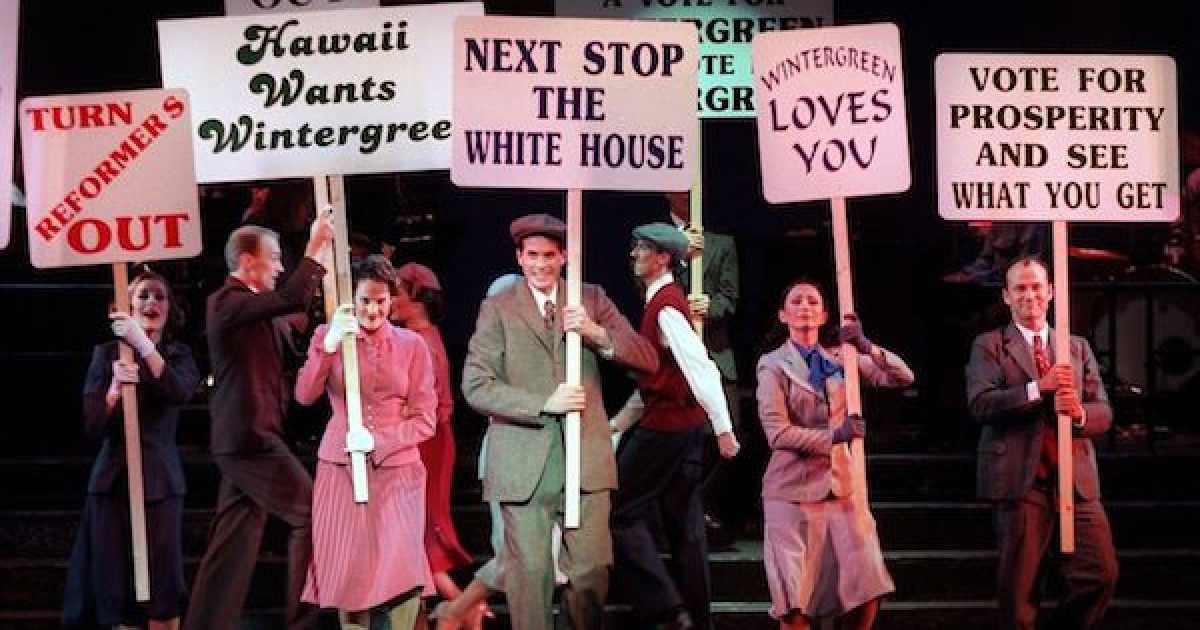Over seventy years ago, December 26th, 1931 the most biting political satire ever written opened at the Music Box Theater on Broadway. Called Of Thee I Sing was the first successful American musical with a consistently satiric tone. What made it work it captured the political feelings of the day. Today’s political feelings are very similar.
Interestingly we see some of the same movements today that were “popular” in the early 1930s. During the worst years of the Great Depression, between 1930 and 1935, there began to be a great attraction to socialism, the Soviet Union, and the American Communist Party. While not a socialist, when FDR became President in 1932 he adapted some of the big government socialist and they worked–for a bit. In 1937 the US faced a recession that was almost as bad as the Great Depression which began in 1929. To be honest, the economy didn’t correct itself until World War II forced the government to ease up on regulation and allow companies to do their jobs (sound familiar) to support the war effort.

Campaigning
It is in the environment of the worst years of the depression that Of Thee I Sing was produced. But in today’s climate of identity politics, Of Thee I Sing is just as relevant and biting as it was in 1931. The play lampoons identity politics lampoons a political system too tied up in personalities and silly little issues to fix the country’s economy, and how a completely, gullible American people can be controlled at the hands of an excellent political media spin (sound familiar?). It speaks to politics today and is long overdue for a Broadway revival.
Of Thee I Sing was so biting, so satirical, that the writers and cast of the play and were unsure of what the public’s reception would be, prompting one of the writers of the book, George S. Kaufman, to quip “Satire is what closes on Saturday night.” Ah but it didn’t. In fact, Of Thee, I Sing was the first musical to win the Pulitzer Prize.
The creative team behind the musical was a Broadway All-Star team. The book was written by George S. Kaufman (You Can’t Take it With You) and Morrie Ryskind. The team’s previous collaboration was Animal Crackers, a Broadway musical written for the Marx Brothers (Ryskind went on to write many of the Marx Brothers movies).
George and Ira Gershwin wrote music and lyrics. George Gershwin was perhaps America’s most celebrated composer of music at the time, writing everything from musicals to opera, to classical music and ballet. Ira Gershwin is one of the American musical’s greatest lyricists, who wrote for both stage and screen (including the original A Star is Born).
The play tells the story of presidential candidate John P. Wintergreen. As his campaign song says,” he’s the man the people choose, loves the Irish and the Jews (song below).”
For Vice President, the choice is Alexander Throttlebottom, a man best known for gaffes (sound familiar) and who throughout the play gets thrown out of essential meetings because, despite the fact he is the vice president, no one knows who he is.
For the Wintergreen political campaign, the party elite (specifically political bosses Louis Lippman and Francis X. Gilhooley, newspaper magnate Matthew Arnold Fulton, Senators Carver Jones, and Robert E. Lyons) selects a political platform meant to avoid political controversy– the “love platform.”
The party elite also decides the bachelor Wintergreen needs to get married, so they hold a beauty contest. The selected winner is the sultry southern belle, Diana Deveraux.

The Beauty Contest To Pick The First Lady
As happens with most campaigns, the candidate throws a wrench into the plans. In this case, he refuses to marry the contest winner. Right after Miss Deveraux is announced as the winner, candidate John P. Wintergreen stops the pageant because he has fallen in love with the all-American Mary Turner whose primary qualification is… well:
“some girls can make a pie made up of prunes and quinces, some make an oyster fry others are good at blintzes, some lovely girls have done wonders with turkey stuffings but I have found the one who could really make corn muffins.”

Jilted
The Supreme Court is called in to decide between corn muffins and justice. They march on to the stage singing: “We’re the one, two, three, four, five, six, seven, eight, nine Supreme Court Judges. We have powers that are positively regal; Only we can take a law and make it legal.”
After the court, the audience meets the least sympathetic character in the play, the French Ambassador. Even back then (as Al Bundy once said) everyone hated the French. The Ambassador escalates the Diana Deveraux scandal, bursting into the White House demanding retribution for the affront to France. The insult is based on the fact that the sultry contest winner Diana Deveraux is “the illegitimate daughter of an illegitimate son of an illegitimate nephew of Napoleon.”
France is not happy, so to placate the French, the political operatives decide to have the President impeached. The Senate roll call for impeachment is not going well for Wintergreen, at least at the beginning it looks like he will be thrown out of office, But just as the Senate vote is getting really gloomy, in bursts the First Lady, Mary Turner who announces she’s expecting. Since no expecting President has ever been impeached the impeachment is called off (she ends up with twins–because it was the politically expedient thing to do).
Below is the vocals for the stinging Senate impeachment scene:
Of Thee, I Sing is an exceptional play because it connected with the mood of America during the first part of the depression. That mood is similar to today, a feeling that much of our government is run by a bunch of well-meaning fools, who get tied up in their own underwear trying to get anything done. Over and above the great music, comedy and biting satire, the element that worked best was a sense of optimism; a feeling that however bad things get things eventually would turn out fine. That optimism is uniquely American.
Of Thee I Sing was revived a few times, a planned movie version starring the Marx Brothers never came together (thank God), there was even a dreadful TV version starring Carroll O’ Connor (it was the musical comedy equivalent of the Star Wars Christmas Special), but it was never brought back at the right time.

The musical comedy equivalent of the Star Wars Christmas Special
Of Thee I Sing is merciless in the way it attacks all American institutions, the nine members of the Supreme Court care more about politics than justice (just like today), the Senators care more about petty local politics than doing their jobs, the political operatives don’t give a rat’s ass about what the country needs. They only care about public opinion and maintaining power, and identity politics are more important than issues.
Some things never change.
This classic of American theater works best during a time when the country is facing political distress, at a time when the country looks for entertainment poking fun at what they are going through while understanding that as bad as things get, in the end, everything will be just fine. A time like now
Oh…and the play ends with the Supreme Court deciding the gender of the presidential babies.
And what of Ms. Deveraux? Vice-President Throttlebottom reminds us when the President is not able to fulfill his duty, that obligation is taken over by the Vice-President. So Throttlebottom gets Deveraux
In the end, everyone is happy, the President has his Mary (and corn muffins). After all, “Posterity is Just Around The Corner”
Of Thee I Sing






